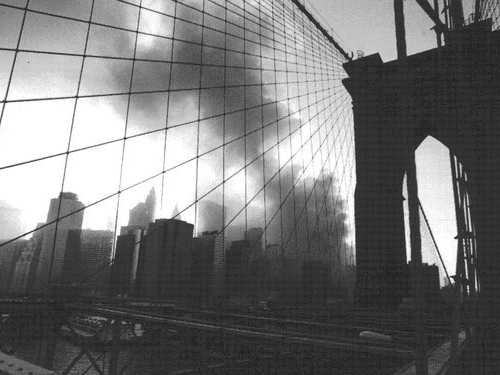This is the first of a series of articles profiling films and filmmakers showing their work at the 2012 G.I. Film Festival being held May 14-20 in Washington, D.C.
A dramatic film and a unique documentary at this year’s G.I, Film Festival were both inspired by the 10th anniversary of the attacks of 9/11. Director, producer and writer Jennifer Gargano’s “8:46” is a fictional tribute to the common New Yorkers from all walks of life who were so personally impacted by the attacks.
“That tragedy affected so many different people, old, young, different nationalities, people from all over the world,” says Gargano, a 26-year old directing her first feature film. Gargano was only 14 when the two airliners were crashed into the Twin Towers.
“I didn’t really realize the gravity of the situation when I was in high school. It was horrible, of course, but when I moved to New York to pursue my acting career I could suddenly put real faces to the numbers of people whose lives were so changed by those events.”
Gargano started writing the film last July, secured a minuscule budget of $20,000 from several investors and the services of a top-notch cinematographer, Mike Hechanova, whose passion for the project drove him to work on it for far below his normal rate, Jennifer points out gratefully.
“Once word got out so many people wanted to be involved, we saw over 500 actors during casting,” she says.
Amazingly she was able to show a rough cut on the 10th anniversary of 9/11 at the Tribeca Film Center in New York City. Several of her actors were actual first hand participants in the real life drama of 9/11, including actual first responders and survivors.
One of the film’s actresses had been in a tower of the World Trade Center on one of the lower floors.
“It wasn’t easy for her. Sometimes we had to give her some extra time, but the authentic emotion we got was amazing,” she says.
“8:46” promises to be an emotional filmgoing experience.
*****
Producer Gil Bindelglas found a unique and compelling story line for his documentary “From Philadelphia to Fallujah” when he wasn’t even looking for one.
“I was living in New York City during 9/11. I actually saw the Twin Towers collapse from my office on the West Side,” Bindelglas says. “A few weeks later I watched the Army – Navy game and gradually the circumstances of how all those young cadets lives were going to change because of the attacks began to dawn on me.”
It took a number of years to really settle in as a possible film, but the now Santa Monica-based film maker found himself drawn back to that legendary inter-service academy football game and what happened to the cadets who played in it. Bindelglas found the journey for his story both inspiring and informative.
“I really didn’t know much about the service academies before this. But I came away impressed with the incredible leadership qualities of the people coming out of West Point and Annapolis,” he says.
Bindelglas and his director, David Hammelburg, found their amazing story line in two Naval academy players and one Army player whose post graduation assignments eventually led them all into combat at the pivotal battle of Fallujah in 2004-2005. That kind of real-life, intense human drama and sacrifice is at the core of “Philadelphia to Fallujah.”
One of the young officers featured makes the ultimate sacrifice. The other two academy graduates’ lives take their own unusual and very personal paths in the aftermath of combat service in Iraq.
The filmmakers also met their own personal deadline, and CBS affiliate WUSA 9 broadcast the film before the 2011 Army-Navy game last year. On one hand combining football and real life combat seems such a natural, yet this appears to be the first time that any filmmaker has taken that unique perspective.

COMMENTS
Please let us know if you're having issues with commenting.